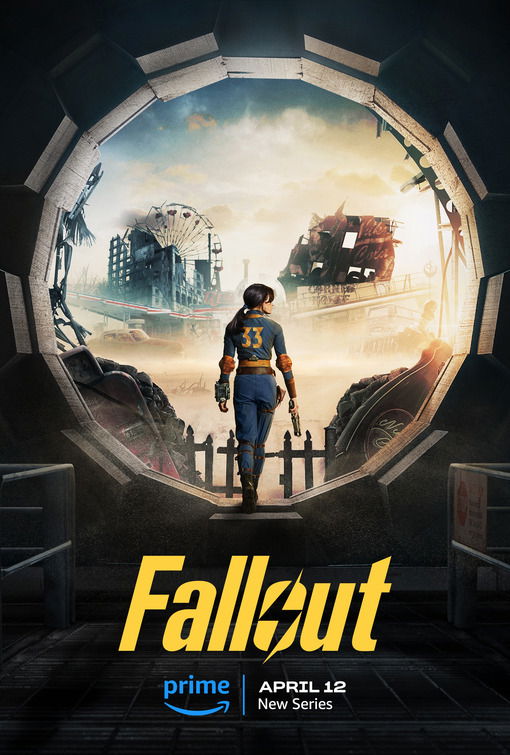“Pitch Perfect but Marred by Unacceptable, Excessive Content”

| None | Light | Moderate | Heavy | |
|---|---|---|---|---|
| Language | ||||
| Violence | ||||
| Sex | ||||
| Nudity |
What You Need To Know:
The creative team has done a spectacular job of bringing the video game world of FALLOUT to life. The writing, acting, cinematography, and 1950s soundtrack are all fitting and sometimes stellar. Lucy, the protagonist, seeks to uphold the Christian, moral values that a 1950s American culture would have had. She also is trying to find and rescue her father. Her morality is mixed with a strong humanist survivalism that prevails in most of the characters she meets in the wasteland outside the vault. Also, Season One of FALLOUT is marred by excessive bloody violence throughout, lots of strong foul language, some lewd content, brief nudity, and drug use. So, it’s excessive, inappropriate and unacceptable for media-wise families.
Content:
Strong moral worldview overall, with the female protagonist seeking to uphold the Christian, moral values that a 1950s American culture would have had and trying to find and rescue her father, mixed with some humanist survivalist themes where many people have lost their moral sensibilities amid hardships and horrors in a postapocalyptic wasteland, but the protagonist never loses hers and quotes and practices the Golden Rule from Matthew 7:12 consistently, which leads to at least one bright spot in this often dark and graphic tale, though she has an open pagan attitude toward sex that doesn’t fit in with the rest of her character, and there’s a pagan cult ritual in Episode 6;
Episode 1 has two “f” words, four other obscenities, one GD, Episode 2 has at least 52 obscenities (mostly “f” words) and several profanities, Episode 3 has 22 obscenities (including about 14 “f” words) and one GD profanity, Episode 4 has at least six obscenities (including three “f” words) and one GD profanity, Episode 5 has three “f” words; Episode 6 has about 12 (including eight “f” words) and one GD profanity, Episode 7: has seven obscenities, including five “f” words, and Episode 8 has four obscenities, including three “f” words;
Many, many scenes of often extreme bloody violence in every episode includes nuclear detonations across the U.S. where millions die, a man attacks a woman with a knife and a fight ensues in which he stabs her in the stomach and she cuts his face with a glass jar (blood on her abdomen as she pulls out the knife and blood flies from him when struck), a bloody battle ensues where many people are killed in gory detail, people stabbed with various sharp instruments and shot with various pistols and automatic weapons, a woman is stabbed in the eye with a fork, a man is gutted with a knife, a man’s throat is cut, a man is cut in half in an automatic door with blood spraying all over another, limbs are lopped off, a man with half his face slashed open attacks a woman, a man drowns another in a pickle barrel, many other various bloody fatalities are shown in great detail, an irradiated ghoul is dug up and comes out of a coffin and kills three men in bloody fashion, man throws a puppy into an incinerator, a dog attacks and kills a man to protect his master, dog brings a severed human hand to his master out of a nearby cave, an irradiated mutant bear attacks a heavily armored soldier, a skull crushing scene, and slow motion combat of all kinds, all with lots of blood;
Episode 1 shows a newly married man and woman are shown having marital relations on their wedding night), the couple is shown in bed right after the fact, and the man gets out of bed naked (rear male nudity), and there’s a brief shot of a soldier abusing himself in an army barracks, Episode 4 shows a man and a pregnant widow about to commit fornication when her water breaks (some kissing and moaning with her sitting on his lap before the scene cuts), and a woman fears that a ghoul has sold her as “a sex slave,” but nothing happens, and in Episode 6 a young woman asks a man if he wants to fornicate while they’re in quarantine, then they have an awkward conversation about his genitals, but no sex occurs;
Scenes of rear male nudity in Episode 1, upper male nudity in a shower in Episode 6, and upper male and female nudity in Episode 6 where male and female cultists in a vault strip their jumpsuits off in a pagan ritual in an extended scene;
Social drinking throughout;
Persons inject themselves, inhale or otherwise take psychoactive drugs which have all kinds of effects, a raider on an enhancer drug becomes very hard to kill, a person shot with a dart loses control of their motor skills, a young man in the Brotherhood of Steel, a postapocalyptic paramilitary group, smokes a cigarette and passes it to another young man, and a ghoul takes a drug by mouth; and,
Loads of questionable moral choices are considered and made throughout the course of this blood and guts epic.
More Detail:
Lucy’s search for her father leads her to a man who most of the factions of the wasteland are after because of the advanced technology he carries. When Lucy discovers this tech may be the only way to find and rescue her father, she’s willing to make great sacrifices to acquire it. Now with the help and protection of a member of the “Brotherhood of Steel,” Lucy must seek to avoid the grisly nature of the wasteland long enough to retrieve this tech. Confronted with horrific hostility, depravity and bloodshed everywhere, can these two really make a difference in this malevolently indifferent postapocalyptic world?
The creative team of FALLOUT has done a spectacular job bringing the video game world to life in the series. From the propaganda piece artwork of the Fallout Boy to the expansive vistas of a postapocalyptic North America; from the Pip Boys and Nuka Cola to the Ghouls and mutants; from the unique wasteland factions to the compelling story arcs of multiple complex characters, the series does justice to the groundbreaking video game. Ella Purnell does a standout job as the female protagonist. Her character is one of the few really honorable characters in the series. Walton Goggins is also excellent in his dual role of Hollywood star/nuclear survivor and the long lived Ghoul whose storyline is intricately woven into the main character’s story arc. The writing, acting, cinematography, and 1950s soundtrack are all fitting and sometimes stellar. Finally, the powerful dystopian refrain from the games, that “war never changes,” is clearly borne out in the series as a whole. Overall, Season One is a powerful opening eight episodes.
Despite all these accolades, the series remains excessively violent in a brutally realistic way. While it is nothing the games do not throw at players, many scenes are disturbing in a way a virtual videogame simply can’t be. It is one thing to see acts of atrocity carried out on computer generated characters and another to see this with flesh and blood actors. Some of the stomach-turning scenes are such that these run the risk of alienating viewers. If one has played the games, he knows he’s in for a wild and violent ride. Even with this expectation, however, the series sometimes goes overboard. When will filmmakers realize that subtlety and leaving room for the imagination to work is more expressive than hyperbole and the shock factor?
The dominant worldview of the series is moral. For example, Lucy, the protagonist, seeks to uphold the Christian values that a 1950s U.S. culture would have had and searching to find and rescue her father. However, her open attitude towards sexual intercourse shows an historical inaccuracy. It reminds viewers that cinematic depictions usually tell us as much about our time than the past or future time they’re portraying. The overall morality of Lucy is mixed with a strong humanist survivalism which prevails in most characters in the wasteland. However, she decries the evil all around her, quoting and practicing the Golden Rule from Matthew 7:12 consistently to oppose the darkness of “life up here.” Many characters lose their moral sensibilities amidst hardships and horrors in this postapocalyptic wasteland. However, the female protagonist, despite her attitude toward sex, never loses hers, which leads to at least one bright spot in this often dark and graphic tale.
Not every episode in FALLOUT is unacceptably excessive. However, Season One of FALLOUT contains many excessive scenes, especially when it comes to violence. Season One also has lots of strong foul language, especially in Episodes Two and Three, a graphic bedroom scene in Episode One, explicit sexual nudity n Episode Six, and some drug use.



 - Content:
- Content: 
